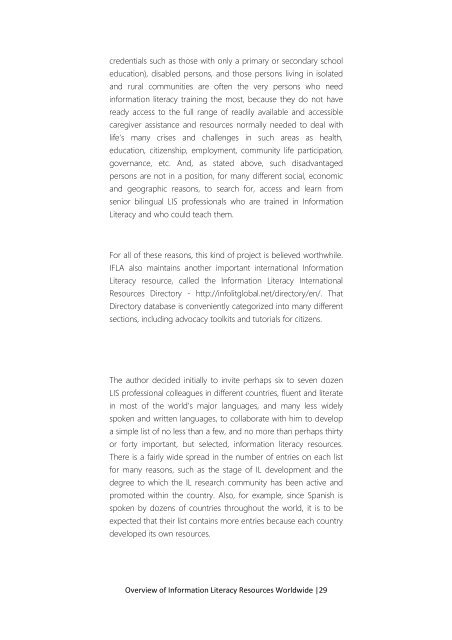2_UNESCO_Composite_Document
2_UNESCO_Composite_Document
2_UNESCO_Composite_Document
You also want an ePaper? Increase the reach of your titles
YUMPU automatically turns print PDFs into web optimized ePapers that Google loves.
credentials such as those with only a primary or secondary school<br />
education), disabled persons, and those persons living in isolated<br />
and rural communities are often the very persons who need<br />
information literacy training the most, because they do not have<br />
ready access to the full range of readily available and accessible<br />
caregiver assistance and resources normally needed to deal with<br />
life’s many crises and challenges in such areas as health,<br />
education, citizenship, employment, community life participation,<br />
governance, etc. And, as stated above, such disadvantaged<br />
persons are not in a position, for many different social, economic<br />
and geographic reasons, to search for, access and learn from<br />
senior bilingual LIS professionals who are trained in Information<br />
Literacy and who could teach them.<br />
For all of these reasons, this kind of project is believed worthwhile.<br />
IFLA also maintains another important international Information<br />
Literacy resource, called the Information Literacy International<br />
Resources Directory - http://infolitglobal.net/directory/en/. That<br />
Directory database is conveniently categorized into many different<br />
sections, including advocacy toolkits and tutorials for citizens.<br />
The author decided initially to invite perhaps six to seven dozen<br />
LIS professional colleagues in different countries, fluent and literate<br />
in most of the world’s major languages, and many less widely<br />
spoken and written languages, to collaborate with him to develop<br />
a simple list of no less than a few, and no more than perhaps thirty<br />
or forty important, but selected, information literacy resources.<br />
There is a fairly wide spread in the number of entries on each list<br />
for many reasons, such as the stage of IL development and the<br />
degree to which the IL research community has been active and<br />
promoted within the country. Also, for example, since Spanish is<br />
spoken by dozens of countries throughout the world, it is to be<br />
expected that their list contains more entries because each country<br />
developed its own resources.<br />
Overview of Information Literacy Resources Worldwide |29


